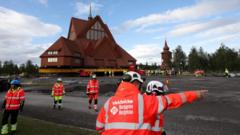Mumbai faces its heaviest monsoon rains in years, with infrastructure strain evident and calls for improved city planning echoing amidst chaos.
Heavy Rain Causes Chaos in Mumbai: Life Disrupted and Rescue Operations Underway

Heavy Rain Causes Chaos in Mumbai: Life Disrupted and Rescue Operations Underway
Severe flooding and disrupted transport in India's financial hub lead to mass evacuations and flight cancellations.
Heavy rainfall in Mumbai has thrown life into disarray, flooding roads and causing significant interruptions in travel throughout the city. Reports indicate that many areas are submerged, making navigation nearly impossible as residents wade through waist-deep water. Videos circulating online depict the dire circumstances, with some individuals resorting to swimming to avoid being trapped.
Rescue operations have surged in response, with close to 600 individuals saved from an overwhelmed monorail that halted mid-journey, resulting in at least 23 needing treatment for suffocation. Civic authorities are stepping in, evacuating approximately 350 residents from vulnerable low-lying zones to temporary shelters.
Mumbai's local schools and colleges remain closed, and the local weather office has issued a red alert, predicting continuing adverse weather. The region, which typically faces heavy monsoon rains, has experienced an extraordinary 800mm of rainfall over a mere four days, surpassing average August levels. Rain-related incidents have claimed at least 21 lives in just the last few days.
Train services crucial for the city's 12 million residents have faced extensive delays, causing thousands to wait on platforms for hours. Reports reveal that trains scheduled for the previous night only departed the following morning. Flight operations at the city's international airport have also been hindered, leading to the cancellation of about 50 flights in recent days.
An incident on the monorail, which was extremely overbooked, saw passengers stuck without air conditioning, leading to panic and the need for fire department intervention to safely evacuate them from the elevated station. Authorities have initiated an inquiry into the circumstances of the train's halting, primarily attributing it to overcrowding issues.
Criticism of the government's handling of the crisis has intensified, with opposition figures highlighting a lack of preparedness despite earlier alerts. Allegations of "zero planning" and mismanagement are raised, with particular concern over the new water-logging issues seen around recently developed infrastructure.
Public outcry is growing on social media platforms, where citizens voice dissatisfaction with the city’s deteriorating infrastructure and inadequate planning. Experts assert that while Mumbai has made strides in modernizing its infrastructure, including roads and metro systems, the aging drainage networks and climate-resilient measures have not kept pace with the rapid population growth.
Rescue operations have surged in response, with close to 600 individuals saved from an overwhelmed monorail that halted mid-journey, resulting in at least 23 needing treatment for suffocation. Civic authorities are stepping in, evacuating approximately 350 residents from vulnerable low-lying zones to temporary shelters.
Mumbai's local schools and colleges remain closed, and the local weather office has issued a red alert, predicting continuing adverse weather. The region, which typically faces heavy monsoon rains, has experienced an extraordinary 800mm of rainfall over a mere four days, surpassing average August levels. Rain-related incidents have claimed at least 21 lives in just the last few days.
Train services crucial for the city's 12 million residents have faced extensive delays, causing thousands to wait on platforms for hours. Reports reveal that trains scheduled for the previous night only departed the following morning. Flight operations at the city's international airport have also been hindered, leading to the cancellation of about 50 flights in recent days.
An incident on the monorail, which was extremely overbooked, saw passengers stuck without air conditioning, leading to panic and the need for fire department intervention to safely evacuate them from the elevated station. Authorities have initiated an inquiry into the circumstances of the train's halting, primarily attributing it to overcrowding issues.
Criticism of the government's handling of the crisis has intensified, with opposition figures highlighting a lack of preparedness despite earlier alerts. Allegations of "zero planning" and mismanagement are raised, with particular concern over the new water-logging issues seen around recently developed infrastructure.
Public outcry is growing on social media platforms, where citizens voice dissatisfaction with the city’s deteriorating infrastructure and inadequate planning. Experts assert that while Mumbai has made strides in modernizing its infrastructure, including roads and metro systems, the aging drainage networks and climate-resilient measures have not kept pace with the rapid population growth.


















